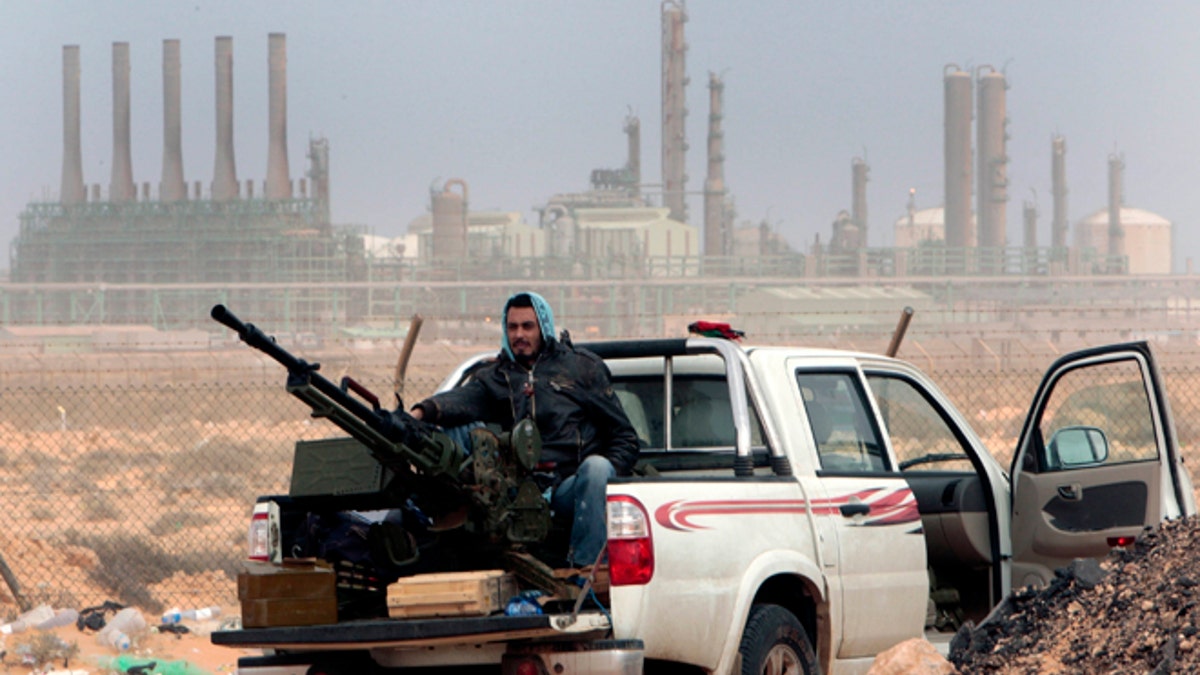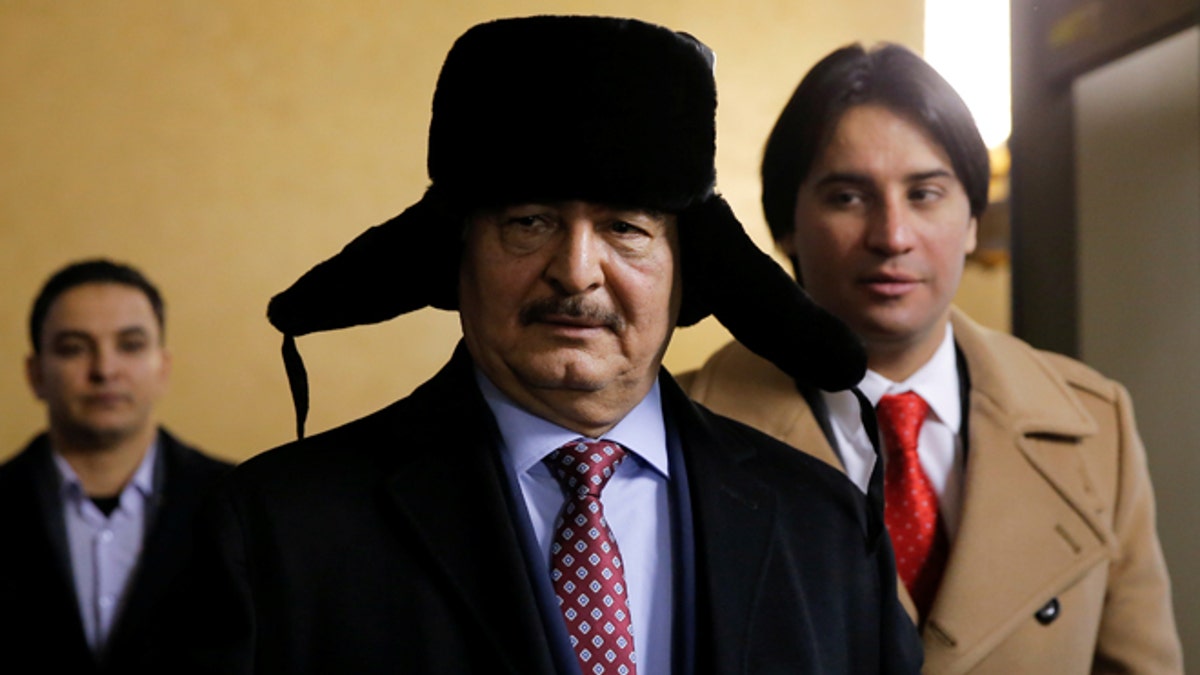
FILE - In this March 5, 2011 file photo, an anti-government rebel sits with an anti-aircraft weapon in front an oil refinery in Ras Lanouf, eastern Libya. The fight for Libyas Ras Lanuf refinery and nearby Sidr depot threatens to spiral into open conflict between rival factions vying for power from east and west. With both sides claiming the facilities as their own but control unclear, decisive days lie ahead. (AP Photo/Hussein Malla, File)
A new report last weekend has revealed that a force of several dozen armed private security contractors from Russia had operated in a part of Libya controlled by regional strongman Khalifa Haftar.
Coming just days after the Pentagon’s top Africa official warned the Senate that Moscow was trying to “do a Syria” in the North African nation, the report of Russian mercenaries in the war-torn country once again raises questions about the government of Vladimir Putin’s intentions in Libya and its United Nations-backed government, which Western countries see as the best chance of restoring stability to war-torn Libya.
“Russia is trying to exert influence on the ultimate decision of who and what entity becomes in charge of the government inside Libya,” General Thomas D. Waldhauser, the chief of the Pentagon’s Africa command, said in a testimony to the Senate’s foreign relations committee last week.
Russia has already irked numerous Western governments with its support of the brutal regime of Syrian President Bashar al-Assad and, despite assurances from Oleg Krinitsyn - owner of private Russian firm RSB-group – that the mercenaries were sent to Libya as a commercial arrangement, it is unlikely that the Kremlin did not grant Krinitsyn its approval, according to Reuters.
Krinitsyn told Reuters that his firm did not work with the Russian defense ministry, but was "consulting" with the Russian foreign ministry.
RSB-group sent the contractors to eastern Libya last year and they were pulled out in February having completed their mission. The task of the security contractors was to remove mines from an industrial facility near the eastern Libyan city of Benghazi, in an area that Haftar's forces had liberated from Islamist rebels.
Krinitsyn did not say who hired his firm, where they were operating or what the industrial facility was. He did not say if the operation had been approved by the U.N.-backed government, which most states view as the sovereign ruler of Libya.
Earlier this month Russian Foreign Minister Sergei Lavrov held talks in Moscow with Fayez Seraj, the head of the U.N.-backed government in Tripoli, where he reaffirmed the Russian Federation’s support of working toward a united government in the oil-rich nation.
"Moscow confirmed its readiness to work closely with all sides in Libya with the aim of seeking mutually acceptable solutions to create the grounds for the stable development of Libya as a united, sovereign and independent state," the ministry said in a statement.
Despite the Lavrov’s promises, actions by the Kremlin indicate that it is strongly in favor of Haftar taking control of the country and not just the eastern section currently under his control. In February Reuters reported that around 70 soldiers fighting for Haftar have been sent to Russia for treatment and Haftar has publically met with Russian officials at least three times – twice in Moscow and once aboard a Russian aircraft carrier in the Mediterranean where he spoke with Defense Minister Sergei Shoigu.
Over the weekend, Haftar’s forces launched a series of airstrikes against the western Libyan city of Sidra, the country’s biggest oil port which has recently been the scene of intense between Haftar’s troops and militias in the west.
In another worrying step, the eastern parliament last Tuesday voted to withdraw support from the United Nations peace deal that created the Tripoli government in January 2016 in hopes of ending years of chaos in the North African country. The withdrawal of support further undermines the government, which has had difficulty asserting authority even in Tripoli.

General Khalifa Haftar (C), commander in the Libyan National Army (LNA), leaves after a meeting with Russian Foreign Minister Sergei Lavrov in Moscow, Russia, November 29, 2016. (Reuters)
Hafter, an army general, former CIA asset and U.S. citizen who lived nearly 20 years in American exile, is the most powerful figure in the east, touting himself as the champion against Islamic militants in Libya — though his enemies accuse him of aiming to become a new dictator like Moammar Gadhafi, who was overthrown and killed in the country's 2011 Arab Spring revolt. He has talked of marching to take Tripoli to unite the country, hinting that he aims to rule. He opposed the government set up by the U.N. peace deal because it would have pushed him out as head of the military.
The general is backed by Egypt and Russia, but Washington under the Obama administration kept him at arm's length. One key question in Haftar’s future will be whether the U.S. warms up to him under President Donald Trump.
Hafter's forces seized the oil facilities last year. The Obama administration had joined the U.N. in calling on him to hand them over to the Tripoli government.
But now that they have been wrested from him by force, he may resort instead to an all-out fight against Tripoli. His army says it is massing forces east of the terminals, awaiting orders. Their strength is unclear but they can call on reserves of thousands of eastern Libyan fighters and tribesman and are backed by Libyan and foreign air support. Hafter travels regularly to Cairo and insiders have said he flew there shortly after losing control of the terminals.
The Associated Press and Reuters contributed to this report.








































